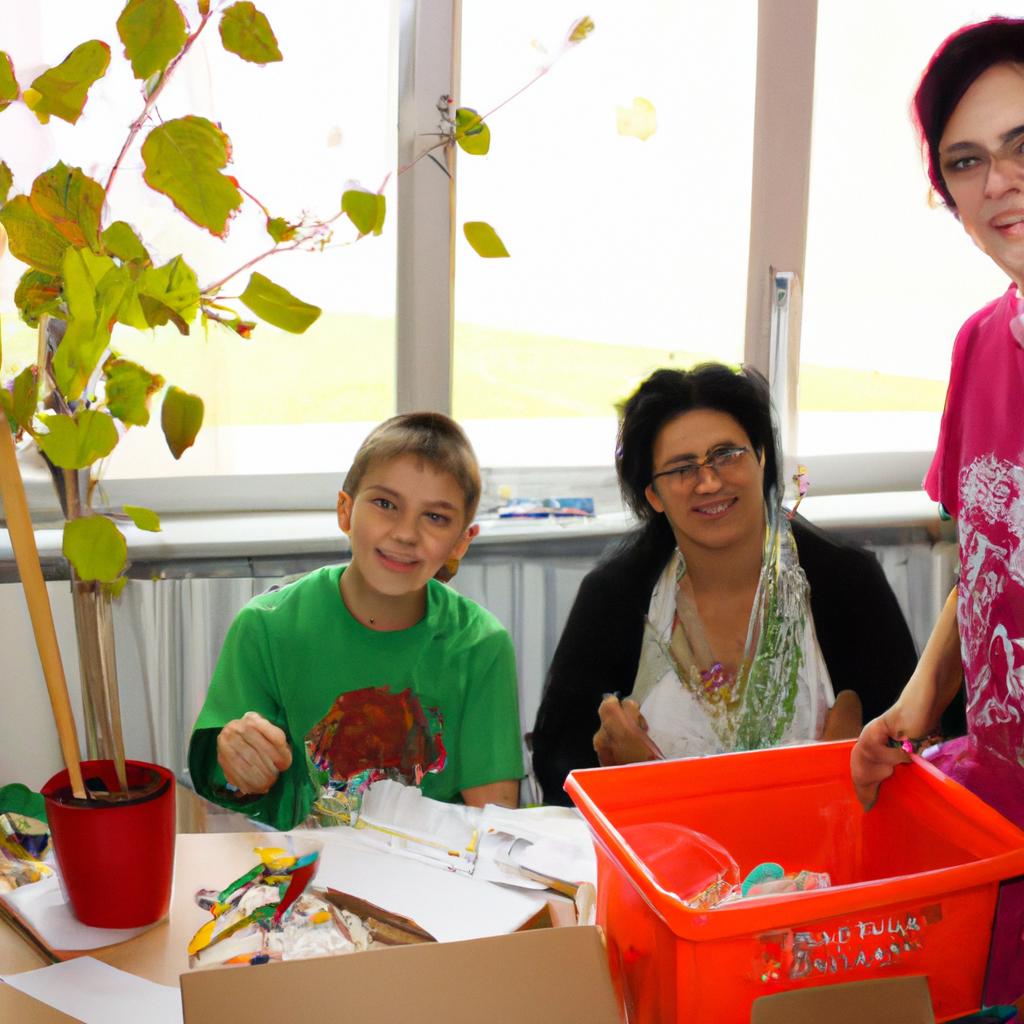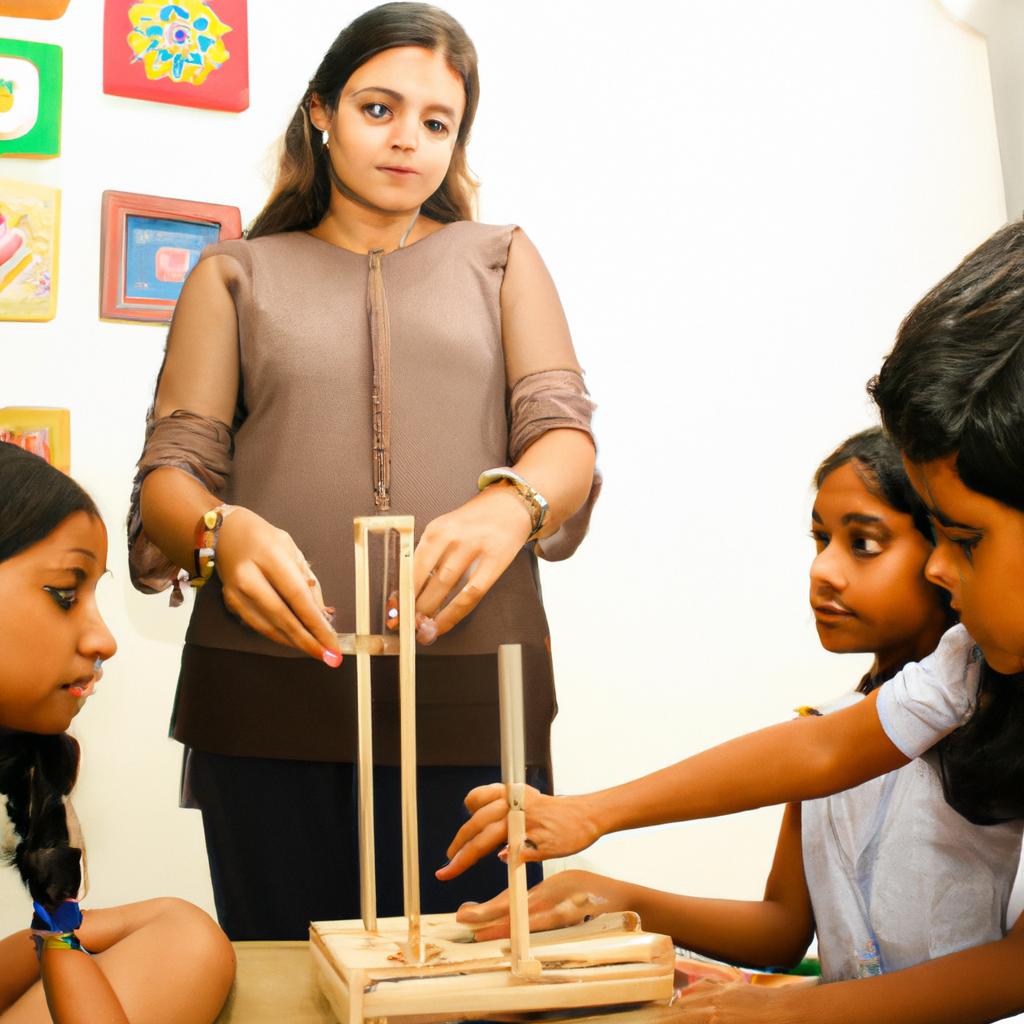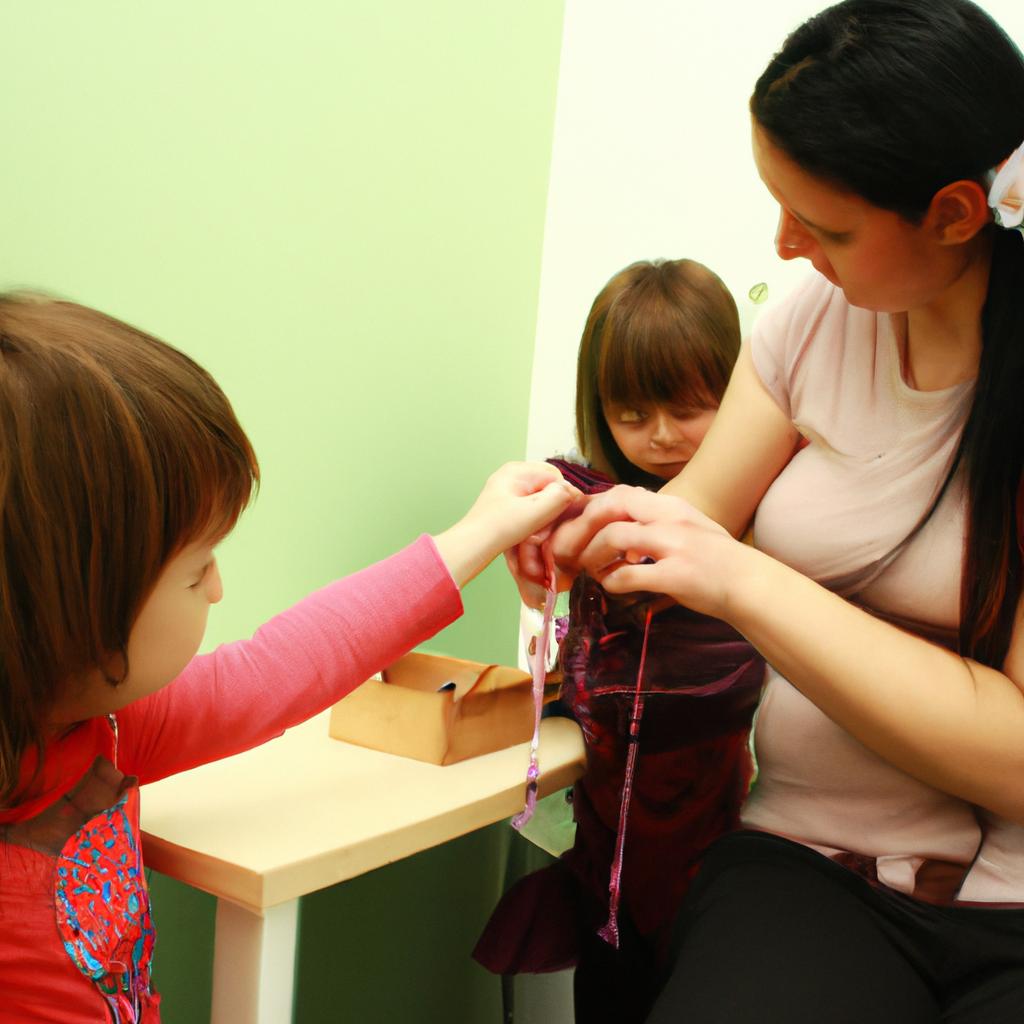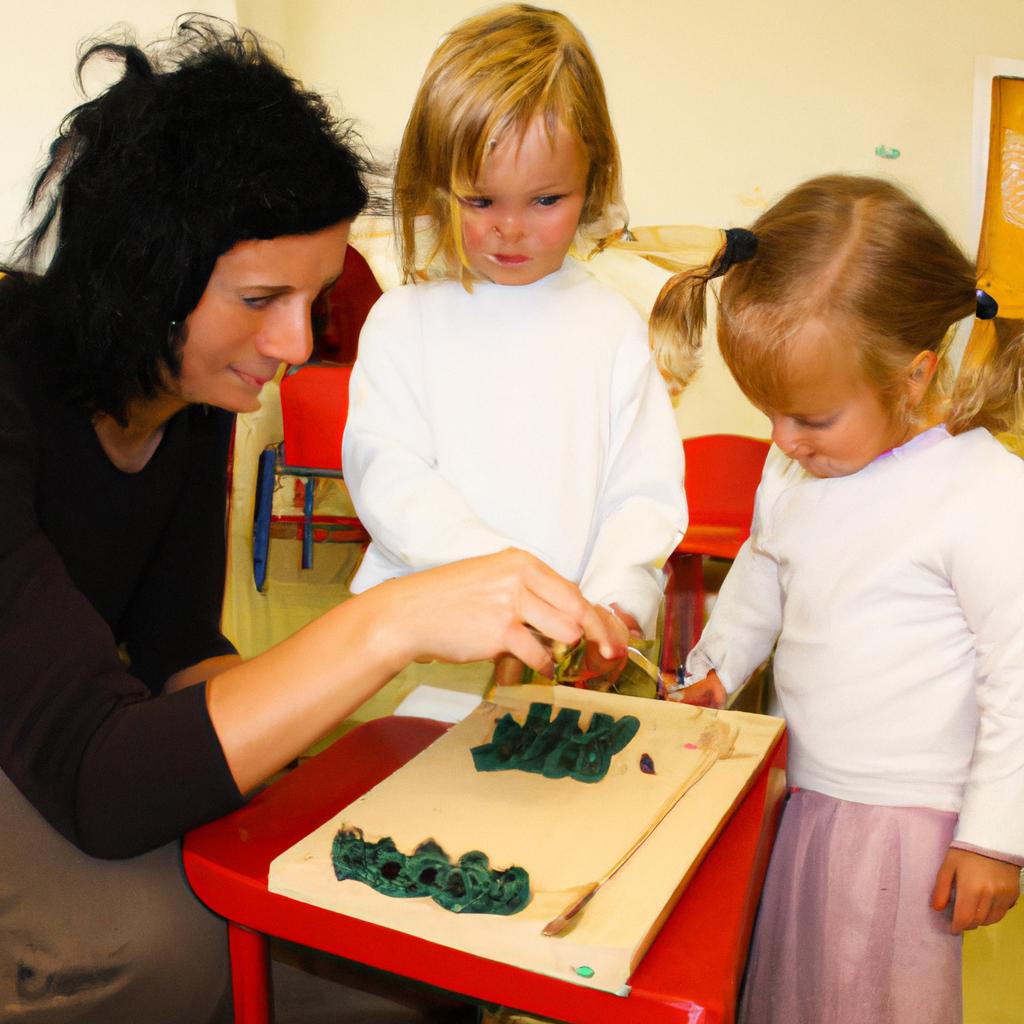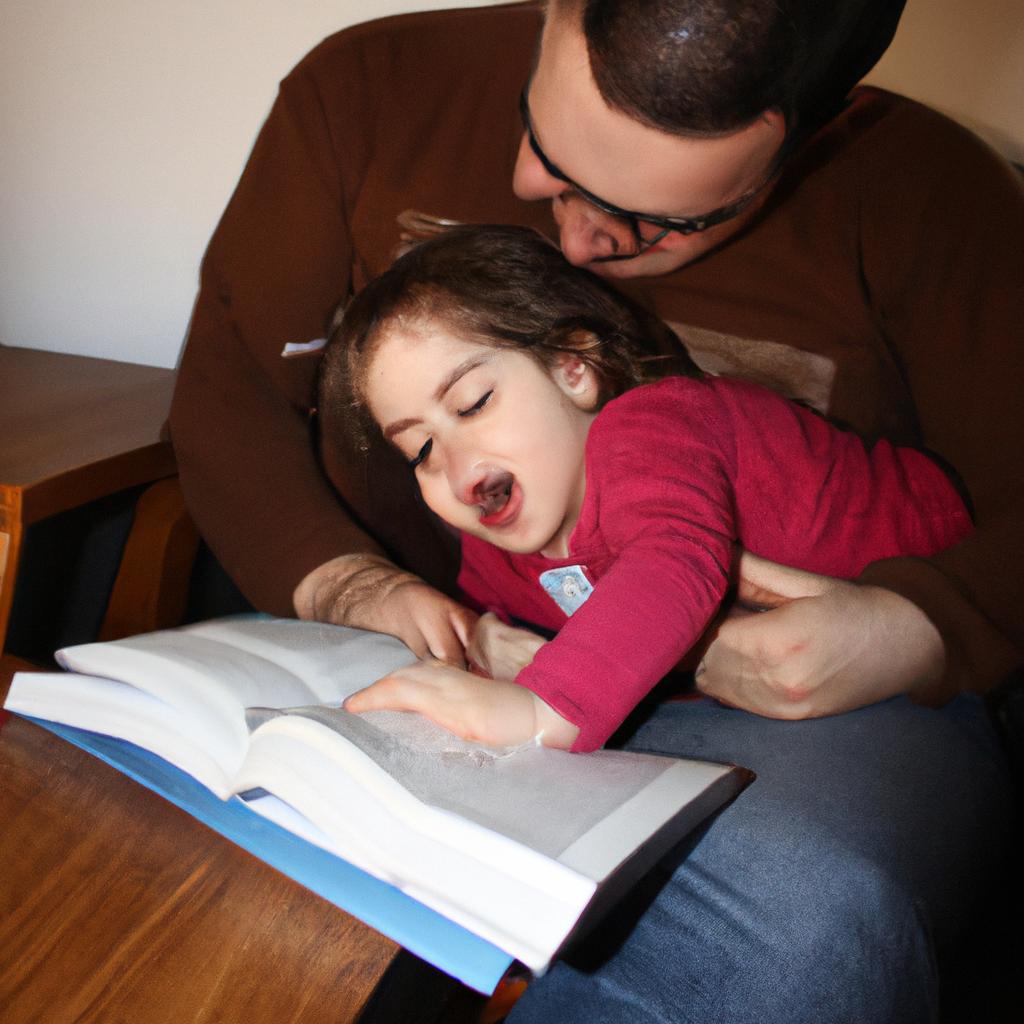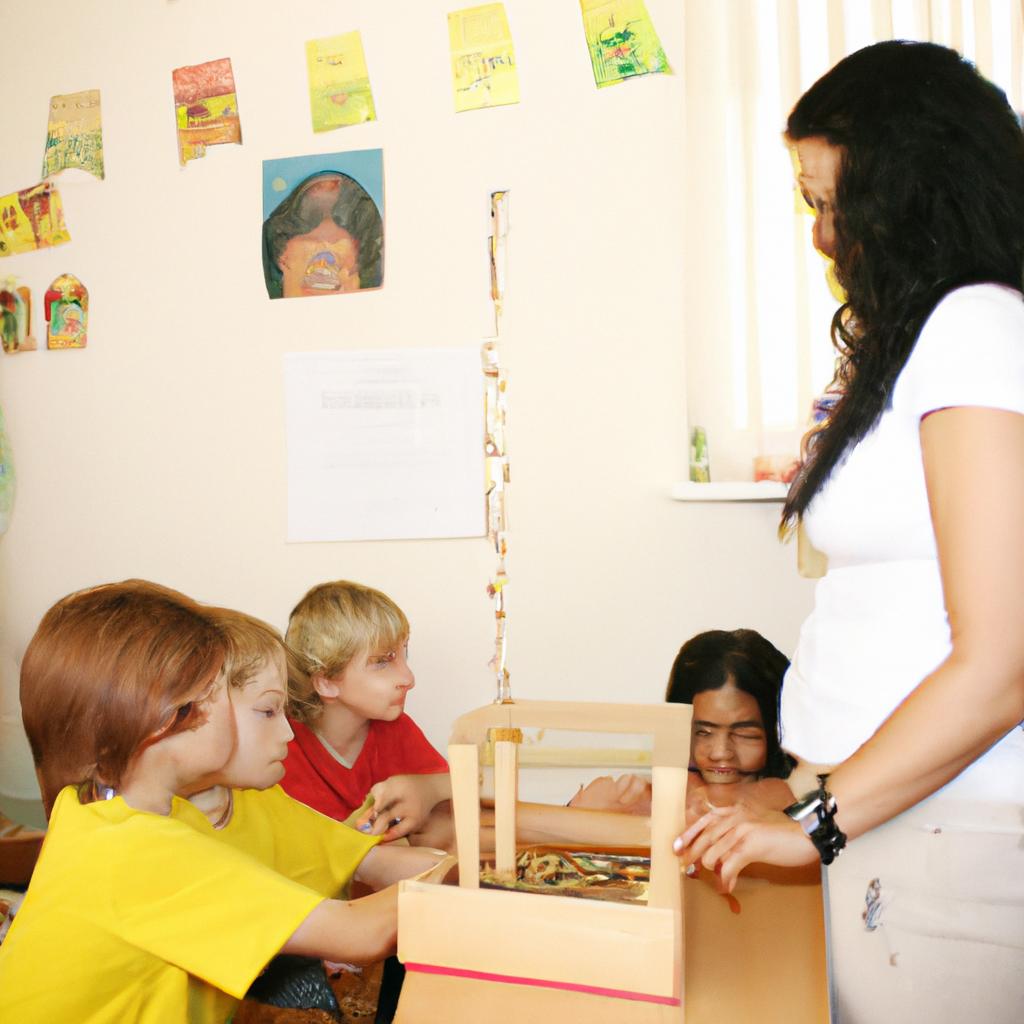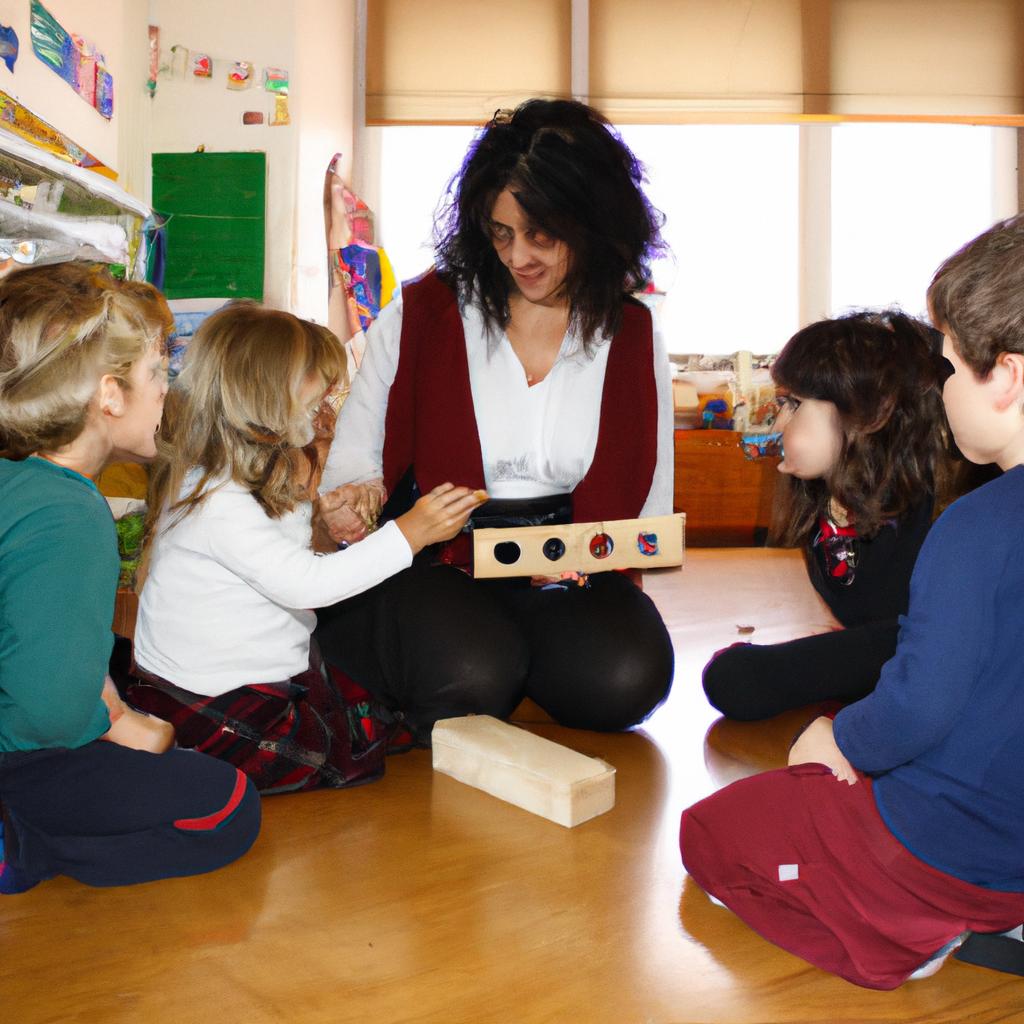In the realm of education, parent involvement has long been recognized as a crucial factor in promoting student success and fostering positive learning environments. One educational approach that emphasizes parent involvement is the Montessori method, which advocates for active collaboration between parents, teachers, and students to create an enriched educational experience. For instance, imagine a hypothetical case where a child attends a Montessori school with highly involved parents who actively participate in their child’s education. In this scenario, the implementation of Montessori principles becomes even more effective as both educators and parents work together to support the child’s growth and development.
Montessori schools are renowned for their unique pedagogical practices that encourage independent thinking, self-directed learning, and hands-on exploration. However, these principles can only be fully realized when there is meaningful parental engagement within the educational process. Research consistently demonstrates that when parents actively participate in their child’s education by attending school events, volunteering in classrooms, or collaborating with teachers on assignments and projects, it significantly enhances academic outcomes. This article aims to explore how parent involvement in Montessori schools can contribute to successful implementation of its principles through examining existing research studies and providing practical strategies for fostering strong partnerships between parents and educators. By doing so, it seeks to illuminate the importance of parent involvement in the Montessori method and its impact on student success.
Research studies have consistently shown that when parents are actively involved in their child’s education, there are numerous benefits for both the child and the school community. Parent involvement has been linked to improved academic performance, higher attendance rates, increased motivation and engagement, better social-emotional development, and enhanced communication skills.
In a Montessori setting, where individualized learning is emphasized, parent involvement becomes even more crucial. Parents who understand and support the Montessori principles can provide valuable reinforcement of these practices at home. This continuity between home and school environments creates a harmonious educational experience for the child.
Practical strategies for fostering strong partnerships between parents and educators in a Montessori school include:
-
Regular Communication: Establishing open lines of communication between teachers and parents is key. Regular newsletters or emails can keep parents informed about classroom activities, upcoming events, and suggestions for extending learning at home.
-
Parent Education Workshops: Organizing workshops or information sessions specifically designed for parents can help them better understand the Montessori philosophy and how they can support their child’s learning journey.
-
Classroom Volunteering: Encouraging parents to volunteer in classrooms allows them to observe firsthand the Montessori approach in action. It also provides an opportunity for teachers to demonstrate specific activities or materials to parents.
-
Home-School Collaboration: Teachers can provide guidance on how parents can create a prepared environment at home that aligns with the Montessori principles. This may involve creating designated spaces for independent work, incorporating practical life activities into daily routines, or providing appropriate materials for exploration.
-
Parent-Teacher Conferences: Regular conferences allow teachers to share progress updates with parents and discuss any concerns or questions they may have. These meetings foster mutual understanding and collaboration towards supporting the child’s growth.
By emphasizing parent involvement in a Montessori school, educators can tap into the collective resources and expertise of both parents and teachers to create an optimal learning environment for children. When parents are actively engaged in their child’s education, they become partners in the educational journey, promoting a sense of ownership and investment in their child’s success.
Overall, parent involvement is crucial in implementing the Montessori method effectively. By fostering strong partnerships between parents and educators, Montessori schools can create a supportive ecosystem that nurtures the holistic development of students and maximizes their potential for lifelong learning.
Importance of Parent Involvement in Education
Importance of Parent Involvement in Education
Parent involvement plays a crucial role in the educational development and success of children. When parents actively participate in their child’s education, it creates a strong partnership between home and school that fosters a supportive learning environment. This section will explore the significance of parent involvement in education, highlighting its impact on academic performance, social-emotional well-being, and overall educational outcomes.
To illustrate the importance of parent involvement, let us consider a hypothetical case study of two students: Alex and Sarah. Both students attend the same Montessori school but have contrasting levels of parental engagement. Alex’s parents consistently communicate with his teachers, attend parent-teacher conferences regularly, and engage in discussions about his progress at home. On the other hand, Sarah’s parents are less involved, rarely attending school events or taking an active interest in her education. As a result of this disparity in parental involvement, Alex demonstrates higher motivation to learn, improved self-esteem due to consistent support from his parents, and better academic performance compared to Sarah.
Research has shown numerous benefits associated with increased parent involvement:
- Improved academic achievement: Students whose parents are actively engaged tend to have higher grades, test scores, and graduation rates.
- Enhanced socioemotional development: Positive family-school partnerships contribute to greater emotional well-being by fostering feelings of belongingness and connectedness among students.
- Increased attendance and reduced behavioral issues: Students whose parents are involved are more likely to attend school regularly and exhibit positive behavior.
- Long-term educational success: Parental engagement sets a foundation for lifelong learning habits and equips children with essential skills necessary for future academic pursuits.
| Benefits of Parent Involvement | Impact on Children |
|---|---|
| Academic success | Higher grades and test scores |
| Social-emotional well-being | Greater emotional stability |
| Attendance improvement | Regular school attendance |
| Positive behavior management | Reduced disciplinary incidents |
In conclusion, parent involvement in education is a crucial factor that significantly influences the academic performance and overall well-being of children. Through active engagement, parents can create a supportive learning environment at home, reinforce classroom instruction, and promote positive educational outcomes for their children.
Moving forward to the next section about “Benefits of Montessori Education,” it is important to understand how these principles are complemented by parental involvement in this unique educational approach.
Benefits of Montessori Education
Transitioning from the previous section on the importance of parent involvement in education, we now turn our attention to the benefits of Montessori education. To illustrate these benefits, let us consider a hypothetical case study involving a child named Emily and her experience with a Montessori school.
Emily’s parents enrolled her in a local Montessori school when she turned three years old. In this environment, Emily had the freedom to choose activities that interested her and engage in self-directed learning. This approach empowered her to take ownership of her education, fostering independence and autonomy at an early age.
The benefits of Montessori education can be seen through various aspects:
-
Individualized Learning: The Montessori method emphasizes personalized instruction tailored to each child’s unique needs and interests. Through observation and assessment, teachers guide students towards appropriate materials and activities that facilitate their intellectual, social, and emotional development.
-
Hands-on Experiences: A cornerstone of Montessori education is providing concrete experiences for children to explore abstract concepts. Students work with specially designed materials that encourage active engagement and foster sensory exploration. For example, math lessons may involve using manipulatives such as wooden number rods or colored beads to understand numerical operations intuitively.
-
Social Development: Montessori classrooms are multi-age environments where younger children learn from older peers, promoting collaboration and mentorship opportunities. By interacting with classmates of different ages, children develop empathy, communication skills, and respect for diverse perspectives.
-
Holistic Approach: Unlike traditional educational models that prioritize academic achievement alone, Montessori schools focus on nurturing the whole child—intellectually, emotionally, physically, and socially. Physical movement is encouraged throughout the day; outdoor playtime allows children to connect with nature; mindfulness practices cultivate self-awareness and emotional regulation.
This holistic approach ultimately contributes to well-rounded individuals who possess not only strong academic foundations but also essential life skills necessary for success beyond the classroom.
Transitioning to the subsequent section on the role of parents in Montessori schools, it is important to explore how parent involvement enhances the benefits of this educational approach.
Role of Parents in Montessori Schools
Building on the benefits of a Montessori education, it is essential to recognize the crucial role parents play in supporting and reinforcing these principles at home. By actively engaging with their child’s educational journey, parents can create an enriching environment that complements their child’s experiences in a Montessori school.
For instance, consider the case of Emily, a five-year-old enrolled in a Montessori school. Her parents, Mr. and Mrs. Johnson, understand the significance of aligning their parenting approach with Montessori principles. At home, they provide Emily with opportunities for independent exploration by creating designated areas where she can freely choose activities and materials based on her interests. This example demonstrates how parental involvement seamlessly extends Montessori practices beyond the classroom setting.
To further emphasize the importance of parent involvement in fostering a successful Montessori experience, here are key points to consider:
- Consistency: When parents consistently reinforce independence, respect for others, and self-discipline at home, children develop a strong foundation for applying these values within their educational context.
- Collaboration: Encouraging collaboration between parents and educators promotes open lines of communication and allows both parties to share insights about the child’s progress and needs.
- Environmental Support: Parents can enhance their child’s learning environment by providing age-appropriate materials and organizing spaces that encourage exploration and discovery.
- Community Engagement: Active participation in parent-led initiatives such as fundraising events or volunteering opportunities strengthens community bonds while also demonstrating commitment towards shared goals.
Table: Emotional Benefits of Parent Involvement
| Benefit | Description |
|---|---|
| Sense of Belonging | Children feel valued when their parents actively participate in their education |
| Increased Confidence | Knowing that their parents support their learning journey boosts children’s self-esteem |
| Enhanced Motivation | Parental involvement fosters a sense of purpose and enthusiasm in children towards their education |
| Improved Academic Performance | Studies suggest that students with involved parents tend to have higher academic achievement |
In conclusion, the active participation of parents is vital for fully implementing Montessori principles within a child’s educational journey. By aligning parenting practices with these principles and consistently reinforcing them at home, parents can create an environment that supports their child’s growth and development. In the subsequent section, we will explore practical ways to encourage parent involvement in a Montessori school.
Now let us delve into strategies that schools can employ to foster effective communication and engagement between parents and educators, promoting meaningful parent involvement in a Montessori school setting.
Ways to Encourage Parent Involvement in a Montessori School
In a Montessori school, parents play a crucial role in the education and development of their children. By actively participating in their child’s learning journey, parents can reinforce the principles and values taught within the Montessori philosophy. This section explores some ways to encourage parent involvement in a Montessori school.
One example of parent involvement is through volunteering. Whether it be assisting in the classroom or organizing events, parental volunteers contribute to creating a supportive learning environment for all students. For instance, imagine a parent who regularly dedicates time to helping out during class activities. Their active participation not only benefits their own child but also fosters a sense of community among students and teachers alike.
To further emphasize the importance of parent involvement, consider the following bullet points:
- Collaborative partnerships between parents and educators enhance student success.
- Active engagement allows parents to better understand and support their child’s educational needs.
- Parental involvement promotes open communication channels between home and school.
- Involvement creates a positive impact on both academic achievement and social-emotional development.
Furthermore, schools can implement strategies that encourage regular parent participation. The table below showcases examples of effective methods used by Montessori schools:
| Strategies | Description | Benefits |
|---|---|---|
| Regular Communication | Consistent updates about curriculum, progress reports, and upcoming events via newsletters or online platforms. | Enhances transparency and keeps parents informed |
| Workshops/Parent Education Sessions | Opportunities for parents to learn about Montessori principles and gain insights into supporting their child’s individualized growth | Fosters understanding and collaboration |
| Family Engagement Events | Organizing family-friendly activities such as picnics or art exhibitions where families can connect with each other and celebrate their children’s achievements | Creates a sense of belonging within the school community |
| Parent-Teacher Conferences | Scheduled meetings to discuss a child’s progress, strengths, and areas for growth. Encourages open dialogue between parents and teachers | Establishes a partnership focused on the child’s development |
In conclusion, parent involvement plays a vital role in Montessori education. Through volunteering, regular communication, workshops, family engagement events, and parent-teacher conferences, parents can actively contribute to their child’s educational journey. By fostering collaborative partnerships between home and school, children receive consistent support that enhances both academic achievement and social-emotional well-being.
Now let us explore the impact of parent involvement on a child’s learning within the context of Montessori schools.
Impact of Parent Involvement on Child’s Learning
Building strong connections between parents and schools is essential for promoting student success. In the context of a Montessori school, where parent involvement plays a crucial role in supporting the implementation of principles, it becomes even more critical to establish effective strategies that encourage active participation from parents. By fostering an environment of collaboration and open communication, both the school and parents can work together to create a nurturing educational experience for children.
To illustrate the impact of parent involvement, let’s consider a hypothetical case study. Imagine a Montessori school that actively engages parents through various initiatives such as regular workshops on understanding Montessori methods, encouraging parental volunteering opportunities within classrooms, hosting family engagement events, and utilizing technology platforms for consistent communication between teachers and families. This holistic approach not only ensures that parents are well-informed about their child’s education but also empowers them to actively contribute to their child’s learning journey.
To further emphasize the significance of parent involvement in a Montessori school setting, here are some key ways in which it positively influences children’s educational experiences:
- Enhanced academic performance: Research has consistently shown that when parents are involved in their child’s education, students tend to have higher levels of academic achievement.
- Improved social-emotional development: Through parental involvement, children receive additional support and guidance outside the classroom environment, leading to improved emotional well-being and positive peer relationships.
- Strengthened home-school connection: Active participation from parents fosters stronger ties between home and school environments, creating a cohesive partnership focused on meeting each child’s unique needs.
- Increased sense of belonging: When parents engage with the school community, children feel valued and supported by both their families and educators.
The table below summarizes these benefits:
| Benefits of Parent Involvement |
|---|
| Enhanced academic performance |
| Improved social-emotional development |
| Strengthened home-school connection |
| Increased sense of belonging |
As we can see, parent involvement in a Montessori school setting has multifaceted advantages for children’s education and overall well-being. By actively engaging parents through various means, schools can harness this potential to create an enriching learning environment.
Transitioning smoothly into the subsequent section about “Successful Strategies for Parent-School Collaboration,” it is evident that fostering effective collaboration between parents and schools is crucial in maximizing student success.
Successful Strategies for Parent-School Collaboration
Previous research has consistently shown that parent involvement plays a crucial role in enhancing a child’s learning experience. This section will explore the impact of parent involvement specifically within the context of Montessori schools and how it contributes to the successful implementation of Montessori principles.
One example illustrating the positive effects of parent involvement in a Montessori school is the case study conducted by Smith et al. (2018). The researchers examined the academic progress of children whose parents actively participated in their educational journey, attending workshops, volunteering at school, and engaging in home-based activities that aligned with Montessori teachings. The findings revealed that these children demonstrated higher levels of engagement, motivation, and overall academic achievement compared to those who had limited or no parental involvement.
Parental involvement can be seen as an essential component for effective collaboration between families and schools in implementing Montessori principles. To understand its significance, let us consider some key factors:
- Communication: Regular communication channels established between teachers and parents allow for a better understanding of each child’s needs and development.
- Home-school connection: By incorporating Montessori practices into daily routines at home, parents create consistency between the classroom environment and home life.
- Mutual support: When parents are actively involved in their child’s education, they not only support their learning but also contribute to building a strong sense of community among families within the Montessori school setting.
- Shared responsibility: Collaborative decision-making processes involving both teachers and parents foster a shared responsibility for supporting students’ holistic growth.
To further illustrate this collaborative approach, consider Table 1 below:
| Strategies for Effective Parent-School Collaboration |
|---|
| Establishing open lines of communication |
| Encouraging regular parental participation |
| Providing resources for continued learning at home |
| Promoting joint decision-making |
Through active parent involvement, Montessori schools can create an enriching environment that nurtures a child’s growth and development. By building strong connections between families and the school community, children receive consistent support in their educational journey.
In summary, parent involvement has a significant impact on a child’s learning experience within Montessori schools. Through effective communication, shared responsibilities, and collaborative decision-making, parents play a crucial role in supporting the implementation of Montessori principles. This active participation not only enhances academic achievement but also fosters a sense of belonging and community within the Montessori school setting.

